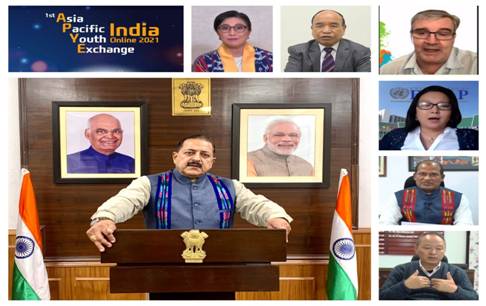Union Minister Dr Jitendra Singh addresses the 42nd Annual General Meeting of the Indian Institute of Public Administration (IIPA) J&K Branch
New Delhi: Addressing the 42nd Annual General Meeting of the Indian Institute of Public Administration (IIPA) J&K Branch in his capacity as National Chairman IIPA, Dr Jitendra Singh, Union Minister of State (Independent Charge) Development of North Eastern Region (DoNER), MoS PMO, Personnel, Public Grievances, Pensions, Atomic Energy and Space, said today that the timing of the meeting in Jammu is crucial on two accounts. First, on the one hand, under Prime Minister Narendra Modi, Civil Services and Governance are witnessing some of the most path-breaking reforms which were unimaginable till a few years ago. On the other hand, he said, Jammu & Kashmir as Union Territory today is much more responsive and readily amenable to adopt these reforms and practices, and also adopt some of the landmark good practices introduced by the Department of Personnel & Training (DoPT) and the Department of Administrative Reforms and Public Grievances (DARPG) which were not adopted by the earlier governments in Jammu & Kashmir.
Dr. Jitendra Singh said, the IAS of today is no longer the IAS of yesteryears with the priorities constantly changing, the mechanisms of delivery changing and even training patterns at Lal Bahadur Shastri National Academy of Administration at Mussoorieis changing. Above all, the expectations from a civil servant have also changed and today he is expected to be far more accessible, far more transparent and far more accountable.
Keeping all these consistencies in mind, Dr. Jitendra Singh recalled that over the last nearly seven years, there have been revolutionary decisions taken to change the face of governance in India. Enumerating a few among them, he mentioned the decision to allow self-attestation of certificates without attestation of Gazetted Officer or anyone else, which was taken immediately after the Modi Government came in 2014. This was followed by abolition of interview for selection to government jobs in certain categories, introduction of three months stint for new IAS officers in the central government before going to their respective State/UT cadre, Amendment in Prevention of Corruption Act 1988 which included making the briber-giver also culpable to offence, Child Care Leave for male employees, enhancement of maternity leave for women employees, Family Pension for divorced daughters, introduction of digital Life Certificate for pensioners, introduction of CPGRAMS driven portal, reorientation of PM Excellence Awards, changes in the curriculum at Lal Bahadur Shastri National Academy of Mussoorie, etc., he added.
Most importantly, Dr. Jitendra Singh said, in the last two months, two historic decisions have been taken. One of them, he said, relates to “Mission Karamyogi”, which envisages continuous capacity building of every officer through digital mode in order to prepare him for every new assignment taken up by him and at the same time also enable the authorities to scientifically choose the right officer for the right assignment, while the second decision relates to constituting National Recruitment Agency (NRA) for conducting Common Eligibility Test (CET) in order to provide level playing field to every job aspirant across the country, regardless of his socio-economic background.
Dr. Jitendra Singh called upon the IIPA to extend its role and become a partner in the capacity building of officers and at the same time sensitize the stakeholders for the recent best practices introduced by the Modi government. He also called upon undertaking an intensive membership drive to enroll younger officers, particularly the serving officers so that the IIPA could live up to its avowed role of a wholesome academic resource body dedicated to orienting the standards of governance and administration in keeping with the 21st Century India.

